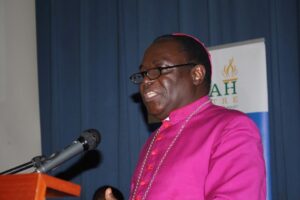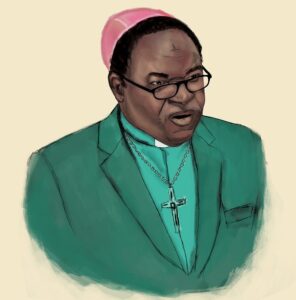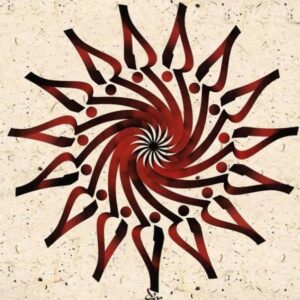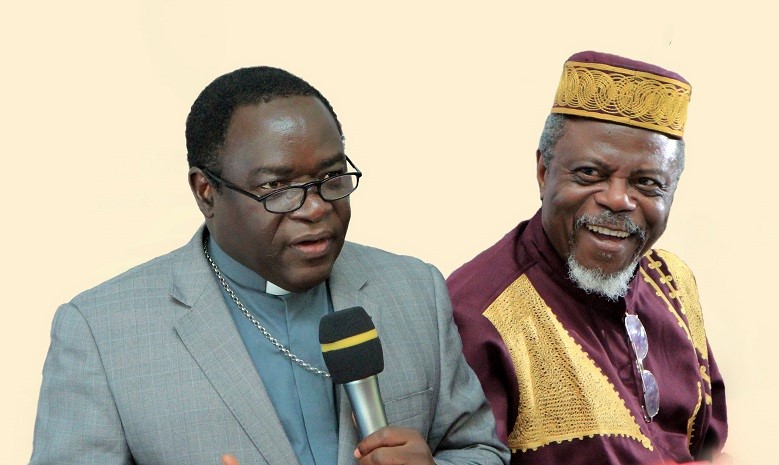“We Are All Slaves of Allah”: Bishop Kukah and the Transformation of Nigeria
Toyin Falola
(Part 2 of 3 of Pre-Interview Series)
 Bishop Kukah
Bishop Kukah
I
لِتَعَارَفُوٓا۟ ۚوَقَبَآئِلَ شُعُوبًا وَجَعَلْنَٰكُمْ وَأُنثَىٰذَكَرٍ مِّن خَلَقْنَٰكُم إِنَّا ٱلنَّاسُ يَٰٓأَيُّهَا
خَبِيرٌ عَلِيمٌ ٱل إِنَّ ۚأَتْقَىٰكُمْ ٱل عِندَ أَكْرَمَكُمْ إِنَّ
O mankind! We created you from a single (pair) of a male and a female, and made you into nations and tribes, that ye may know each other (not that ye may despise (each other). Verily the most honoured of you in the sight of Allah is (he who is) the most righteous of you. And Allah has full knowledge and is well acquainted (with all things). (Quran 49:13)
Nigeria means different things to its peoples. These varying sentiments can be split into three broad categories, which are neither presented as exhaustive nor individually exclusive, but as a realistic enough picture of prevailing mindsets in Nigeria. The first category views Nigeria as “a mere geographical expression” within which they, as members of a sub-national, primordial ethnic identity, have been trapped in an unproductive union with others who do not share their concerns and aspirations. To the second category, it is a multi-ethnic political entity where they are guaranteed access to vast resources, either by virtue of the numerical size, real or perceived, of their ethnic nationalities or by an influence they’ve acquired through illicit accumulation. The third—but far from the least—category are those who are neither privileged by their ethnic origin nor by any financial influence—nor do they care about such things. These three broad categories have equally separate agendas: the first insists on an exit; the second is for the status-quo but offers restructuring as a last-ditch concession; the third is committed to resolving the disparities as a way of correcting what is now a precarious national situation.
In the last couple of years, there have been increasing tensions brewing—mainly between the first two categories of sentiments—within the polity. Such tensions—sustained as they are by the deteriorating economic and security situation in the country—if they spill over, are most likely to be expressed via traditional media, i.e., along ethno-religious lines, which have the potential to throw the country into chaos.
II
انُ قَوْمٍ عَلَىٰٓ أَلَّا تَعْدِلُوا۟ ۚ ٱعْدِلُوا۟ هُوَ أَقْرَبُ لِلتَّقْوَىٰ ۖ وَٱتَّقُوا۟ ٱللَّهَ ۚ إِنَّ ٱللَّهَ خَبِيرٌۢ عْمَلُونَمَا تَبِ
O you who have attained to faith! Be ever steadfast in your devotion to God, bearing witness to the truth in all equity; and never let hatred of anyone lead you into the sin of deviating from justice. Be just: this is closest to being God-conscious. And remain conscious of God: verily, God is aware of all that you do. (Quran 5:8)
Indeed, unguarded statements have proven powerful enough to exacerbate and or set off an already simmering situation, a case-in-point being the 2011 post-election violence, the immediate cause of which has been attributed to the careless statements of a failed candidate. Nonetheless, in as much as we must insist that citizens must guard their utterances, especially in the public domain, we must also try to distinguish between inciting comments and constructive criticism. This is important because it is in our interest and that of our democracy to cultivate the habit of speaking up—soro soke—to draw attention to and condemn, in strong terms, practices that do not bode well for our future, especially where the number one citizen is found lacking. Surely, what can be construed as the tacit complacency and unfounded optimism of this government inspires no calm or confidence among perceptive citizens.
III Kukah
Kukah
سَدِيدًا قَوْلًا ا۟وَقُولُو ٱللَّهَ ٱتَّقُوا۟ءَامَنُوا۟ٱلَّذِينَ يَٰٓأَيُّهَا
يُصْلِحْ لَكُمْ أَعْمَٰلَكُمْ وَيَغْفِرْ لَكُمْ ذُنُوبَكُمْ ۗ وَمَن يُطِعِ ٱللَّهَ وَرَسُولَهُۥ فَقَدْ فَازَ فَوْزًا عَظِيمًا
O you! who have believed, fear Allah and speak only the right words of appropriate justice. He will [then] amend for you your deeds and forgive you your sins. And whoever obeys Allah and His Messenger has certainly attained a great attainment. (Quran 33:70 and 71)
One individual who has always endeavored to speak his truth to power is Bishop Matthew Hassan Kukah. The sixty-nine-year-old Catholic priest who hails from Zangon-Kataf in Kaduna State is observably passionate about Nigeria. With a Ph.D. from the University of London under his belt, Kukah has published extensively on the topic of Nigeria in areas of democracy and civil society, religion, and politics. One of his famed publications is his Religion, Politics and Power in Northern Nigeria (1994). Kukah has served in various capacities under three different administrations. He was a member of the Nigerian Investigation Commission on Human Rights Violations (Oputa Panel) between 1999-2001, Secretary to the National Political Reform Conference; Chairman, Ogoni-Shell Reconciliation; and served in the Committee for Electoral Reform between 2007-2009. Also, he has been appointed to serve in several prestigious capacities by different pontiffs within the Vatican. These and other such engagements have not only granted him access to the corridors of power, but as one might expect, it has also afforded him better insights into Nigeria’s power relations, who the key players are, and other such insider information not available to average Nigerians. This is probably why his opinions on national issues are held in high regard and why they usually stir many controversies.
Since the return of democracy in 1999, Bishop Kukah has been embroiled in several controversies, mainly resulting from his knack for commenting on the actions and inactions of the government of the day. As such, he is considered by many as a clergyman with an agenda. As for this agenda, some say he strives to be the champion of his people (from Southern Kaduna) involved in a “liberation fervor.” Others suggest he is merely lashing out for being ignored by the Buhari administration. Some believe that, as a high-ranking Church official, he represents the interest of the Church and Christians in Nigeria. But before we speculate further on what the Bishop’s agenda might be, let’s take a quick detour to provide some historical context on Church-State relations.
The history of the Church and the State is a checkered one, marked by intermittent conflicts and the occasional harmonization in agenda. The predicament of the Church in China today is a classic example of how the State has attempted to check the influence of the Church in a series of persecution campaigns, which has been unsuccessful. There have also been known attempts in medieval Europe by the Church to usurp State powers through the activities of ambitious men who sat at intervals on the most revered seat (office) in Christendom—that of the Roman Catholic Pope. The fact that the State has always been wary of the Church’s wealth and ability to influence the actions of the multitude under its dome—which the former considers a threat to its sovereignty—has been a constant source of friction. Yet, this has not prevented both the Church and the State from coming together in matters of territorial integrity, social welfare/order, and foreign policy—as was the case with some Western missionaries in Africa during colonization. However, it has led to the separation of the Church and the State, resulting in the creation of secular states. It must be stated here that apart from the occasion of the enlistment of Nigeria in the Organization of Islamic Cooperation (OIC), the Church in Nigeria has had a good working relationship with the State.
The job of a clergyman, especially a priest—in the Roman Catholic sense of the word—appears to be cut and dried: administer the Sacraments, celebrate the Holy Mass, oversee Confession, and other such sacerdotal priestly duties. Hence, to be seen as being friendly, “courting,” or fraternizing with “sinful” and “ungodly” men—as politicians are commonly perceived among Nigerians—amounts to a fall from grace, corruption of character, and an establishment of bias. This begs the questions: Are the duties of a priest really confined to his parish? Does the cassock shield him completely from the odors of a decaying society? Should the priest, as a citizen of the heavenly realm, concern himself with earthly politics, even where it poses a threat to the well-being of his flock? I daresay if we pose these questions to the esteemed Bishop Desmond Tutu (South Africa) or the late Cardinal Joseph-Albert Malula (Congo DRC), their responses will betray a disappointment in our ignorance as to the enormity of the African challenge and why it cannot be picky about whence its savior must come—Bethlehem, Mecca, or Ile-Ife.
IV
Bishop Kukah is hardly your everyday clergyman as he, in his usual unassuming manner, might have you believe. This assertion has very little to do with the fact that he is a Bishop, nor is it owed to his intimidating, yet impressive credentials. What sets Bishop Kukah apart is his commitment to the transformation of Nigeria, which has been manifested in more concrete ways than the occasional public censure that draws cries of alarm and protests from beneficiaries of the day’s establishment. He does not fear Satan:
مُّؤْمِنِينَ كُنتُم إِن وَخَافُونِ تَخَافُوهُمْ فَلاَ أَوْلِيَاءهُ يُخَوِّفُ الشَّيْطَانُ ذَلِكُمُ إِنَّمَا
It is but Satan who instils [into you] fear of his allies. So fear them not, but fear Me, if you are [truly] believers! (Qur’an 3: 175).

His most recent run-in with Aso Rock came in the form of a Christmas homily delivered on December 25, 2020. In unequivocal terms, the Bishop rolled out eight salient points—split between statements on the country’s deplorable economic and security situation and criticism of the president’s handling of national issues. And in the usual manner of a divided society, there was the characteristic uproar between those who felt spoken for and those who felt spoken against. This righteous man—Al-‘Ubudiyyah—delievered the message of Allah—one of love, from the mouth of the truthful (Surah Nisa 4:69), cautious and targeted to the ears of the “true ones” (Surah Tawbha 9:119), and to all Nigerians whom Allah wants to become one nation (IQS. Al-Maaida 5: 48). That speech did not cross the line, was nowhere close to Kitab al- farg, and lacking the rupturing capacity of Al-Maghili’s aj al-din fi ma yajib ‘ala I-muluk. Neither did Hassan, the awj, violated the principles by Allah Subhanahu Wa Ta’ala who said:
يٰٓأَيُّهَا الَّذِينَ ءَامَنُوا لَا يَسْخَرْ قَوْمٌ مِّنْ قَوْمٍ عَسٰىٓ أَنْ يَكُونُوا خَيْرًا مِّنْهُمْ وَلَا نِسَآءٌ مِّنْ نِّسَآءٍ عَسٰىٓ أَنْ يَكُنَّ خَيْرًا مِّنْهُنَّ ۖ وَلَا تَلْمِزُوٓا أَنْفُسَكُمْ وَلَا تَنَابَزُوا بِالْأَلْقٰبِ ۖ بِئْسَ الِاسْمُ الْفُسُوقُ بَعْدَ الْإِيمٰنِ ۚ وَمَنْ لَّمْ يَتُبْ فَأُولٰٓئِكَ هُمُ الظّٰلِمُونَ
“O you who have believed, let not a people ridicule [another] people; perhaps they may be better than them; nor let women ridicule [other] women; perhaps they may be better than them. And do not insult one another and do not call each other by [offensive] nicknames. Wretched is the name of disobedience after [one’s] faith. And whoever does not repent – then it is those who are the wrongdoers.” (QS. Al-Hujuraat 49: Verse 11)
Kukah’s khutbah—low grade compared to the Ilorin acidic street minstrels— was to unify, to bring peace and progress, to demand justice and equity, all in the established tradition enjoined by Allah Subhanahu Wa Ta’ala (QS. Aal-i-Imraan 3: 103).
Issues such as the president’s nepotistic-divisive tendencies, the inefficiency of his security chiefs to contain and curtail the insurgency in the Northeast, and the spread and frequency of kidnapping and banditry in other parts of the country were topics on the lips of Nigerians. These have also been the subject of a series of media discussions and publications at home and abroad. Altogether, they were the topical issues that made up most of the national discourse, at least from 2019. That it whips up such a storm on the lips of Kukah speaks to the pedigree of the priest, which is not easily earned, especially in a neo-patrimonial society. Is it therefore not a gift that he has chosen to use this influence in the service of the voiceless and downtrodden?
It hardly requires any divination to discern what Bishop Kukah’s agenda for Nigeria is. Armed with the basic principle of deduction, an observant mind can quickly arrive at a conclusion. A look into his career would reveal a history of over thirty years of contributions to the Nigerian project, during which he served in different sensitive capacities, brokering peace and reconciliation and contributing to the strengthening of the nation’s democracy, as part of several reform initiatives and from his intellectual publications. One of such national assignments he took on, the Ogoni-Shell Reconciliation, lasted for five years. These were five years of unfaltering commitment to a cause vital to Nigeria’s peace, harmony, and survival. It involved extensive consultations reaching as far as the United Nations, many visits to the concerned communities—sometimes at grave personal risks to person and reputation—and all for no other reward than seeing an end to a lingering crisis that threatened the livelihood of the people.
Other evidence of the Bishop’s investment in Nigeria’s development is seen in his concern for and commitment to ensuring peaceful coexistence between Nigeria’s faith groups. This has manifested in the establishment of the Kukah Centre, a policy research institute that emphasizes “inter-faith dialogue” and “involves actively promoting conversations among Nigeria’s faith communities.” Without a doubt, it is an important factor for Nigeria’s development prospects, given the place of religion as a source of discord and a hindrance to social cohesion.
If a man is to be judged by his works and the words from his mouth, then Bishop Kukah is easily established as a patriotic Nigerian who is committed to peace and national development. He has repeatedly demonstrated this by availing himself of the service when called. Unlike many of his peers, he has refused to be hindered by his priestly robes or entertain any fear for his personal safety. Whether the Bishop has read the Qur’an or not, I don’t know, but he has consistently kept to the words in the Hadith on speaking when one sees injustice/evil:
Abu Sa’id al-Khudri reported: The Messenger of Allah, peace and blessings be upon him, said, “Whoever among you sees evil, let him change it with his hand. If he is unable to do so, then with his tongue. If he is unable to do so, then with his heart, and that is the weakest level of faith.” Source: Ṣaḥīḥ Muslim 49. Grade: Sahih (authentic) according to Muslims.
Father Kukah has instead chosen to extend his service to God beyond the walls of his parish. Though some might take exception to his approach to issues, preferring a quiet tête-à-tête method, the Bishop’s style of open criticism has so far yielded the quickest reactions. It has had the desired effect of keeping government on its toes and, hopefully, more awakened to its responsibilities.
For his efforts, the Bishop has been bestowed with several titles: rabble-rouser, bridge-builder, social crusader, development agent, activist priest, and the clergy with an agenda. It is time to ask him to define himself!
Do please join us for a conversation with Bishop Matthew Hassan Kukah:
Sunday, March 7, 2021
5:00 PM (Nigeria)
4:00 PM (GMT)
10:00 AM (Austin CST)
Register and watch at: https://www.tfinterviews.com/post/bishop-kukah


